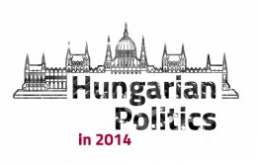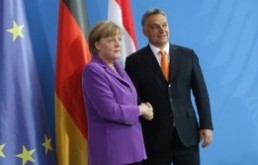
In collaboration with the Friedrich Ebert Stiftung, Policy Solutions presents an annual review of Hungarian politics. This publication is a comprehensive overview of recent developments, events and trends in Hungary in 2014.
More
From a Hungarian perspective, there seem to be two Germanies these days, which is somewhat ironic given that we are coming up on the 25th anniversary of the events that ended Germany's division.
More
We cordially invite you to our international conference entitled “Illiberal democracies in Europe”.The event will be held on the 28th of November 2014, and is organized by the Brussels-based Foundation for European Progressive Studies together with Táncsics Mihály Foundation. The event’s professional partner is Policy Solutions.
More
We cordially invite you to the official book launch of “Hungarian Politics in 2014”, a joint annual review of Friedrich Ebert Stiftung and Policy Solutions. This publication is a comprehensive overview of developments, events and trends in Hungary in 2014.
More
Municipal elections tend to be more grateful subjects for the spokespersons of losing national parties than parliamentary elections because there are hundreds or thousands of results, and victory and defeat are not necessarily clear-cut. Even in the worst defeat, national parties can point to some local successes that redeem their efforts or at lea...
More
On 23rd July 2014 in Budapest, Policy Solutions and the European Values Think Tank (EV TT), a Prague-based public policy research institute, organized a National Seminar on political communication of integration of minorities, consisting of a roundtable discussion and public debate.
More
Fidesz’ media dominance is so conspicuous that even the OSCE’s foreign observers could not help noticing it; it was a significant aspect in their determination that the government had given itself an unfair advantage in the election. Now Fidesz has done a significant step towards remedying this unfair situation by giving the left-wing opposition ac...
More
Even before the actual results were tallied, the 2014 elections to the European Parliament were regarded as unique by analysts on account of the anticipated Europe-wide rise in the strength of euro-sceptic and populist parties. The final results bore out analysts’ expectations.
More
We are pleased to invite you on behalf of European Values Think-Tank and Policy Solutions, in cooperation with Wilfried Martens Centre for European Studies to a Public Debate, titled „Why and How Should Politicians Communicate Integration of Minorities?".
More
The EP election in Hungary resulted in a clear victory for the governing party, Viktor Orbán's Fidesz. The national vote was characterised primarily by an internecine competition on the left and secondarily by a battle between the far-right and the left. The Hungarian Socialist Party (MSZP) lost the former, but left-wing parties outperformed Jobbik...
More